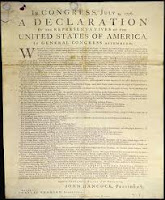Sunday. Yesterday, when I published the draft below of the opening for a statement of the rights of animals, I stupidly cast it as a revision of the historical document, our
Declaration of Independence. I did so thinking wrongly that I would be imitating the way my New Ten Commandments attempted to bring the Mosaic original up-to-date and replace it with a more enlightened set of ethical principles. I thought I'd be imitating the way a rewrite of "Twas the Night before Christmas" would dissolve the saccharine fantasy of Clement Clarke Moore's original lyrics and reveal some of the sordid underbelly of real Christmas as it is "observed" by most Americans.
Neither imitation applies. Yesterday's opening should have been presented simply
as inspired by the Declaration's opening assumption of the rights of man. Then go on from there.
I still think, though, that a useful parallel might be developed with the 1776 document's declaration
of independence—even if, in the case of animal rights, independence is a more complex concept than political independence from England. For in the case of animal rights, from
what would independence be declared? And for whom or what?
It's not simply a question of animals' independence from something (cruel treatment at our hands, for one essential thing), but also of
our independence—from a variety of things: our meat-eating tradition, the market power of the meat industry, perhaps even our inner demons (in contrast to the "better angels of our nature")? A serious obstacle to achieving our "independence" from those (and other) things is that most of them would require a giving-up of something most of us now value—even value so highly as to consider necessity.
I've given the article a new, more accurate title. Its original title is shown below. Despite its being misleading, I'm glad I made a start, however halting and tentative my first step.
New Declaration of Independence
A couple of years ago, I wrote an
alternative version of the Ten Commandments1. And the other day, I suggested that, on behalf of animal rights, the poem "
Twas the Night before Christmas" needed updating to show that all was not peace upon Earth at that time of the year:
'Twas the night before Christmas, when all through the slaughterhouse....
My impulse to revise the creeds by which we ought to live has been extending for days to our
Declaration of Independence, which declared in writing the "unalienable rights of man."
Other animals, too, I do believe, have rights. And if "the rights of man" existed before they were championed by Thomas Paine and Thomas Jefferson and codified in the Declaration of Independence, then so, too, perhaps, did those more fundamental rights of animals. Or, if the rights of man
didn't really always exist, but came to exist only by the essential act of a people's pretending that they did and proclaiming them in writing, then a similar pretense and proclamation could be made on behalf and for the sake of animals who cannot speak for themselves.
It is from that understanding and in that spirit that I propose a New Declaration of Independence. It might open like this:
When, in the course of animal events, it becomes necessary for the animals with a voice to speak for those that have none, and to assume among the powers of the earth the station to which their place in cultural evolution calls them, a decent respect to the opinions of mankind requires that they should declare the causes which impel them to speak for the unspeaking.
We hold these truths to be self-evident, that all animals are created equal with respect to certain unalienable rights, that among these are life....
The recognition of human rights took time, and so will the recognition of animal rights. Conscience calls upon me to begin speaking for the unspeaking, now rather than later.
_______________
- My statement of the New Ten Commandments needs further revision, mainly to reduce their number so as to avoid redundancy. That was the motivation for the late George Carlin's radical reduction of their number to two.
 By Ken Marks
By Ken Marks






